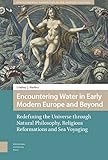Encountering Water in Early Modern Europe and Beyond : Redefining the Universe through Natural Philosophy, Religious Reformations, and Sea Voyaging / Lindsay Starkey.
Material type: TextSeries: Environmental Humanities in Pre-Modern Cultures ; 3Publisher: Amsterdam : Amsterdam University Press, [2020]Copyright date: ©2020Description: 1 online resource (274 p.)Content type:
TextSeries: Environmental Humanities in Pre-Modern Cultures ; 3Publisher: Amsterdam : Amsterdam University Press, [2020]Copyright date: ©2020Description: 1 online resource (274 p.)Content type: - 9789048541058
- Discoveries in geography -- History -- 16th century
- Reformation
- Religion and science -- History -- 16th century
- Water -- Religious aspects -- Christianity
- Water -- Social aspects -- Europe
- History, Art History, and Archaeology
- HISTORY / Europe / General
- Water, Creation, Reformation, sea voyages, blue humanities, oceanography, early modern
- online - DeGruyter
| Item type | Current library | Call number | URL | Status | Notes | Barcode | |
|---|---|---|---|---|---|---|---|
 eBook
eBook
|
Biblioteca "Angelicum" Pont. Univ. S.Tommaso d'Aquino Nuvola online | online - DeGruyter (Browse shelf(Opens below)) | Online access | Not for loan (Accesso limitato) | Accesso per gli utenti autorizzati / Access for authorized users | (dgr)9789048541058 |
Frontmatter -- Table of Contents -- Acknowledgements -- Introduction: Why Water? -- 1. Athens and Jerusalem on Water -- Part I. Water in Exegetical, Natural Philosophical, Cosmographical, and Geographical Texts of c.1000-1600 -- 2. Gathering Water in Exegetical Texts -- 3. Defining Water in Natural Philosophical Texts -- 4. Describing and Depicting Water in Cosmographical and Geographical Texts -- Part II. Why Water -- 5. Water in Newly Rediscovered Ancient and Medieval Texts -- 6. Exploring the Created Universe through Water -- 7. Sea Voyages and the Water-Earth Relationship -- Afterword : The Redefinition of the Universe and the Twenty-First-Century Water Crisis -- General Bibliography -- Index
restricted access online access with authorization star
http://purl.org/coar/access_right/c_16ec
Both the Christian Bible and Aristotle's works suggest that water should entirely flood the earth. Though many ancient, medieval, and early modern Europeans relied on these works to understand and explore the relationships between water and earth, particularly sixteenth-century Europeans were especially concerned with why dry land existed. This book investigates why sixteenth-century Europeans were so interested in water's failure to submerge the earth when their predecessors had not been. Analyzing biblical commentaries as well as natural philosophical, geographical, and cosmographical texts from these periods, Lindsay Starkey shows that European sea voyages to the Southern Hemisphere combined with the traditional methods of European scholarship and religious reformations led sixteenth-century Europeans to reinterpret water and earth's ontological and spatial relationships. The manner in which they did so also sheds light on how we can respond to our current water crisis before it is too late.
Mode of access: Internet via World Wide Web.
In English.
Description based on online resource; title from PDF title page (publisher's Web site, viewed 02. Mrz 2022)


